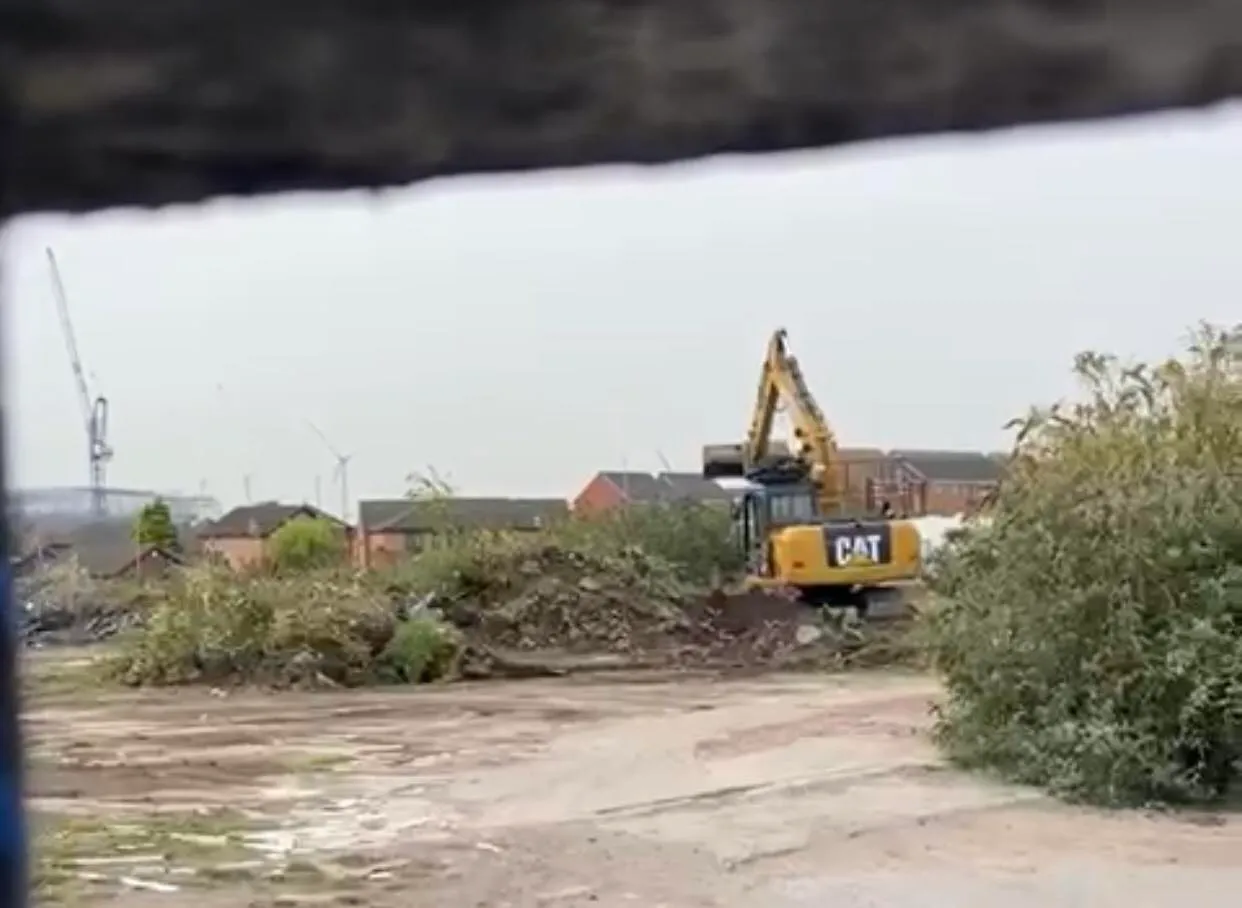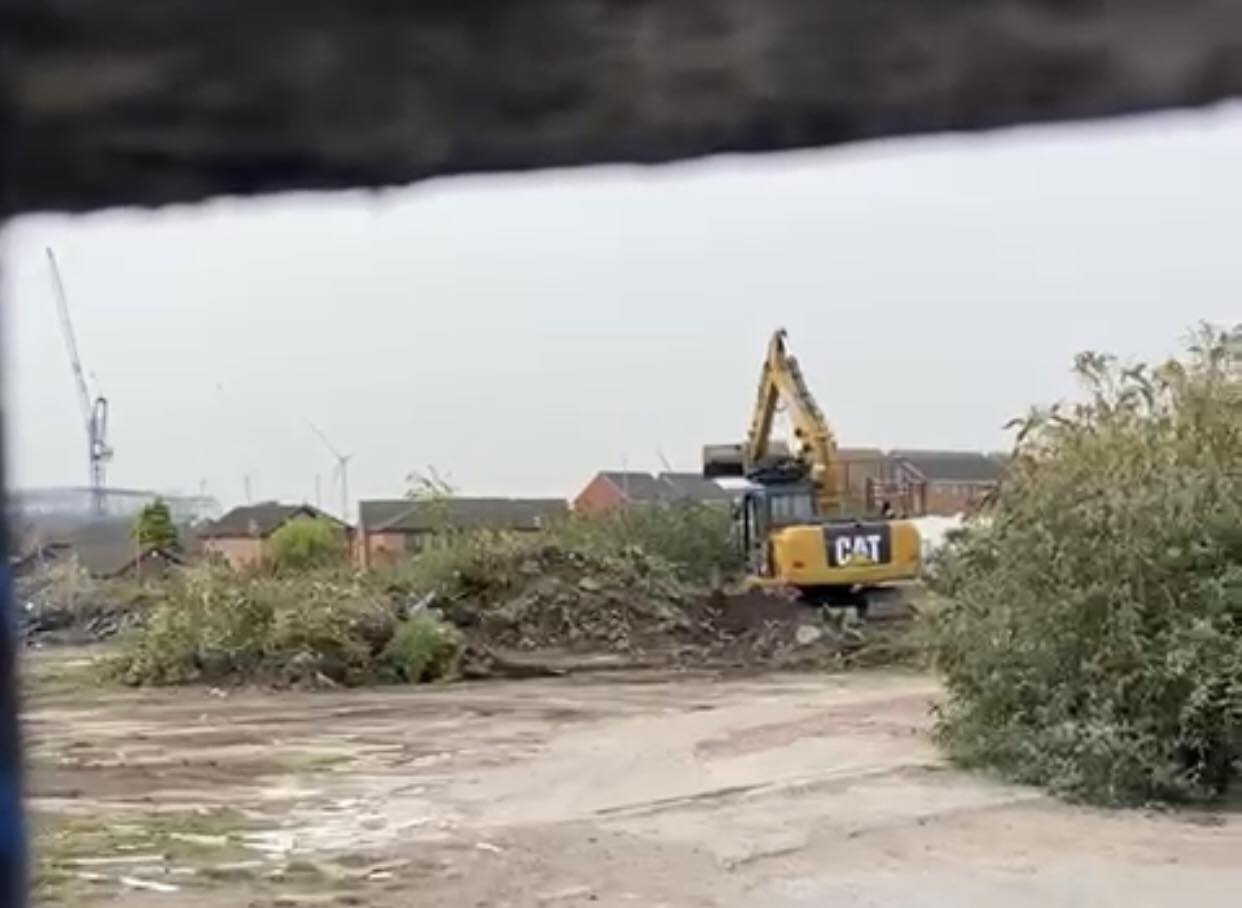A piece of land gifted to one of Liverpool’s poorest communities disappeared offshore. Now it may be turned into flats

Rogue diggers, veiled threats and residents stripped of shares — we return to the Eldonian Village
Dear readers — you may recall our previous coverage of the Eldonian Village, which examined a series of mysterious land transfers — moving assets that were once communally owned by members of the village into the hands of companies based in Caribbean tax havens. The stories we published prompted a huge response and are often cited by new members as one of the reasons they subscribed to The Post.
Well, things have moved on since then. Despite a planning application to build on one of those pieces of land having been knocked back by the council (one councillor described the application as “deplorable”) the village was recently swarmed by diggers tearing up the land and depositing waste materials. It seems to residents that any hope of recovering the land they believe was stolen from them is slipping through their fingers.
When one of the residents questioned what was going on, they allege the men in the diggers threatened to “rip a car” through their front door. It was one of a number of threats allegedly received by residents in recent months, as tensions rise once again.
Today we return to the Eldonian Village, once one of the country’s most inspiring communities: a social housing utopia that rose up from the rubble of north Liverpool in the 80s. These days though, the Eldonian Village is a community on the fritz.
We believe it is important to do a kind of journalism that returns to communities time and again and follows the stories as they develop. This job shouldn’t be about turning up for a day, writing something and then never coming back. But reporting like this isn’t cheap to produce either. While the top half of this newsletter is free to read, you’ll need to sign up as a paying member to read the rest. Our 1,300-odd paying members fund all of our work, and are the only reason we are able to exist and continue to provide the kind of challenging, deeply-reported journalism Liverpool deserves. Do consider taking out a membership today.
Your Post briefing
Tributes to Bill Kenwright have poured in from across Merseyside in the wake of his death at the age of 78. Kenwright, an acclaimed West End theatre and film producer, had been on Everton’s board since 1989 and is considered an enormous figure in the club’s history. Metro mayor Steve Rotheram noted Kenwright’s “support to Hillsborough families”, while Hillsborough campaigner Margaret Aspinall — who lost her son in the tragedy — said he was everything "a human being should be”. The actor Sir Ian McKellen paid tribute to “a unique impresario”, adding: “Whether the West End lights will be turned off in his memory, certainly our business will be dimmer now he has gone.”
Also among those paying tribute was former mayor of Liverpool, Joe Anderson, who knew Kenwright well. Anderson noted Kenwright’s “bravery & dignity” in his fight against brain and liver cancer. “But I know it was the poisonous cancer of so called fans personally attacking him that hurt most & broke his heart,” he added, referring to the considerable backlash against Kenwright recently amid Everton’s poor form. After receiving significant backlash himself for what was deemed a poorly-timed attack on the club’s fans, Anderson followed up by saying: “I will say more, not now but later, to the angry brigade I send you my love and prayers”.
Immigration minister Robert Jenrick will begin closing UK hotels to asylum seekers in the coming days, including The Suites in Knowsley. The Suites achieved national infamy earlier this year after protests broke out against the housing of asylum seekers, with considerable focus on whether or not the protests were far-right in origin. We published a long-read at the time examining what had happened. The Suites is set to be among the first group of 50 hotels to have contracts with the Home Office terminated, with Jenrick saying the government will “not stop there”. Labour’s shadow immigration minister Stephen Kinnock noted that Jenrick was only closing a “paltry” 12% of hotels in use. He said: “He is like an arsonist who has burnt our house down and expects us to thank him for throwing a bucket of water on it.”
A few weeks ago, word began to spread quickly in the Eldonian Village. Diggers had swarmed onto a plot of land on the village, and were tearing it up. As the news bounced around the village’s 400-odd redbrick houses, a few concerned residents came out of their homes to see what was going on. Sure enough, a number of orange diggers were roaming around the once-community owned site where a sports centre used to sit. It looked a mess.
As well as the diggers, large trucks were backing onto the site and dumping waste material, hardcore, soil and general debris. Disturbed by what was happening, Brian Jones — who doesn’t live on the Eldonian but grew up nearby — jumped in his car and followed one of the trucks. It led him all the way to Bootle, to an address owned by a demolition and groundwork company.
Meanwhile, one resident confronted one of the men in the diggers and demanded to know what was happening. Apparently, the man told them to “get a life”. Another one of the machine drivers was apparently even stronger with his words. “We’ve already been talking about you,” he allegedly said. “You’re gonna get a car ripped through your front door”.

To briefly recap, we published a 4,000 word longread on the Eldonian Village back in January. The piece examined how a social housing community that was previously so highly lauded it drew lavish praise from likes of Gordon Brown and King Charles (back when he was a mere prince) had descended into acrimony. It looked at the mysterious sales of once-community-owned assets like a nursery, a village hall and the land of a former sports centre to anonymous offshore companies based in the Caribbean.
The question that remained open was this: what would the land eventually be used for? The answer — not a terribly surprising one, perhaps — is beginning to emerge.
On one of the sites, the answer is a block of flats. More specifically, an application to build 29 flats and 39 houses on the site of the former sports centre is currently in planning limbo. A developer called Kersh Worral, headed up by businessman Jonathan Kersh, has made the application. But here’s the thing. The application — which has unsurprisingly caused uproar among the village’s residents — hasn’t even yet been accepted. In fact the council has knocked it back. So why are diggers tearing up the land?
To be clear: there’s no evidence to say Kersh Worral actually had anything to do with the diggers on the site. What we do know is this: both Michael Wood, the Chief Operations Manager for the Eldonian Community-Based Housing Association, and a man called Anthony McGann were seen on the site over a three day period as the work was done. Wood is one of the main figures involved in the day-to-day running of the village, while McGann you may remember from our first article as the son of Eldonians founder Tony McGann Snr, whose re-emergence in the village after a long absence ruffled considerable feathers. To see two of the village’s known faces overseeing the development work caused alarm.
After all, this is a site of great importance to the Eldonians. The Elaine Norris Centre was built in the 1980s in response to the health needs of the community. This was — and still is — an area of Liverpool with notably poor health outcomes. But in December last year the BBC reported that the land it once sat on had been disposed of by the Eldonian Group, a subsidiary of the Eldonians’ charity, in 2017. The land now belongs to a company called 7 Ruby Road, which is based in the British Virgin Islands, a tax haven.

Latest
Ian Byrne: Why the country — not just Liverpool — needs the Hillsborough Law
The ‘charisma bypass’: Why Liverpool’s leaders are so forgettable
The Mersey’s clean-up cost £8 billion. So why is it still so dirty?
Between Labour, Reform and Jeremy Corbyn, what does Liverpool’s electoral future look like?
A piece of land gifted to one of Liverpool’s poorest communities disappeared offshore. Now it may be turned into flats
Rogue diggers, veiled threats and residents stripped of shares — we return to the Eldonian Village